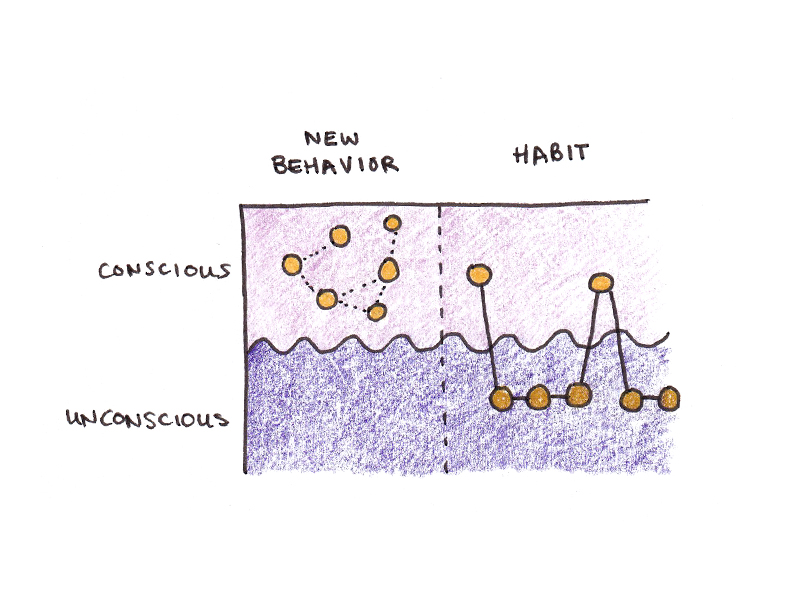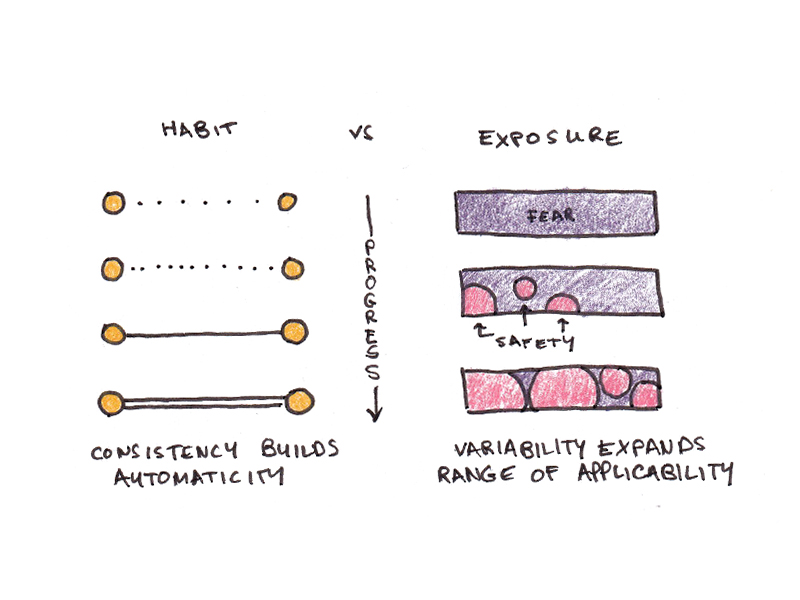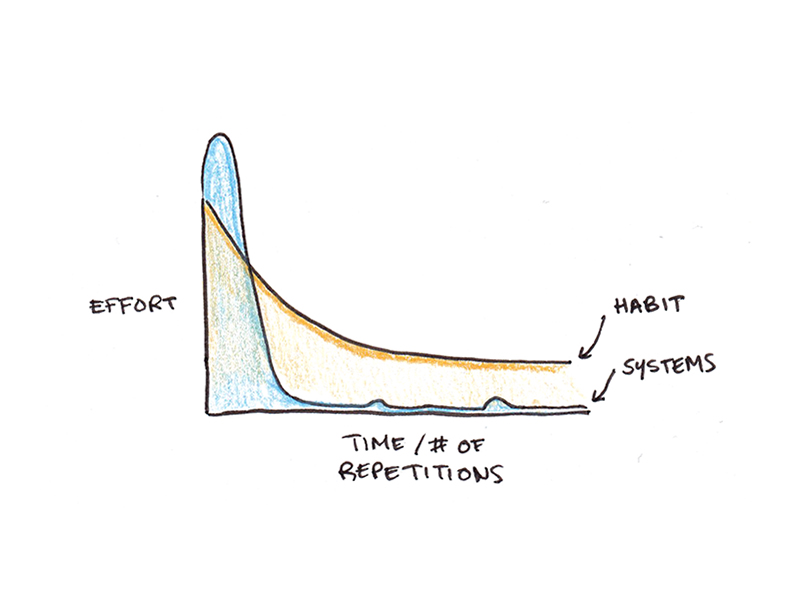I’m launching my new program, Foundations, in a single month. It’s a 12-month course designed that can assist you construct or enhance the important constructing blocks all of us have to stay a great life. It’s additionally a studying mission for myself, which I’ll be protecting on the weblog.
A typical false impression I’ve seen since I first began writing about foundations is that having a stable basis is, basically, only a results of having good habits.
Habits are important, however focusing solely on habits will be deceptive to each the short-term necessities for self-improvement in addition to challenges in sustaining change long-term.
What Habits Are (And What They Aren’t)
Merely put, a behavior is any conduct that has been not less than partly automated. Habits are behaviors we are able to carry out with out vital effort, consideration or thought.
I exploit the phrases “partly” and “vital” right here as a result of most real-life behaviors can’t be fully automated. This was one of many central findings of Shiffrin and Schneider’s authentic experiments on managed and computerized processing.1
As we repeatedly carry out a conduct, similar to making an attempt to kind a behavior or practising a brand new talent, some components of the talent get offloaded to areas of the mind that don’t require acutely aware consideration to function. Nevertheless, different components of the decision-making proceed to require acutely aware management.

Contemplate driving a automobile. Whenever you first realized to drive, you wanted to concentrate to every thing—from which pedal was the gasoline pedal to how a lot to rotate the steering wheel to show the automobile’s tires the correct quantity. Ultimately, most of this stuff grew to become senseless—you simply drive the automobile with out minding the main points. However, even in these instances, we nonetheless want to concentrate whereas we drive, or we’ll get in an accident.
Equally, after we construct a brand new behavior, similar to common train, wholesome consuming, or studying extra books, some parts of that motion get automated, making it simpler to do the suitable factor. But it surely not often reaches some extent the place the conduct is totally on autopilot.
Habits alone are most likely not sufficient for most individuals to maintain long-term adjustments.
What Else Do We Must Make Modifications Final?
If easy habits aren’t sufficient, what else do we have to make long-term adjustments stick?
I can consider a number of totally different psychological processes that make conduct change final in the long run, together with:
- Data. Whereas realizing the suitable factor to do just isn’t sometimes the bottleneck for most individuals, it helps motivation and decision-making. Somebody who understands how investing works isn’t assured to make clever selections together with her financial savings, however she will likely be extra prone to develop wealth than somebody who thinks investing is only a type of playing.
- Self-efficacy. Whereas habits are unconscious biases towards sure actions, self-efficacy is a acutely aware perception in your potential to take these actions. I think many out-of-shape individuals keep that manner as a result of even the considered exercising daily appears unmanageable. Forming habits helps, however a “match” individual—who trusts themself to train frequently—can usually change to fully totally different train routines with out issue as a result of they imagine exercising is enjoyable and straightforward.
- Guidelines. All of us domesticate guidelines for our personal conduct, even when we are able to’t at all times consciously articulate these requirements. An individual may be fully self-indulgent with alcohol and junk meals, for example, however by no means think about taking onerous medication. A rule isn’t only a behavioral tendency however an ordinary you maintain your self to throughout disparate conditions.
- Braveness. As I share in my newest guide, fears are largely provoked by unconscious threat-detection circuitry. These perceived threats bubble up into our consciousness as fears and anxieties, though we frequently can’t rationalize their supply. Publicity to the conditions that set off for our fears with out experiencing undue hurt could make motion simpler.
- Programs. Utilizing an specific software, like GTD to your productiveness, index investing to your funds, or a calendar-based system for managing your skilled commitments can offload a number of the psychological work of making an attempt to make the proper resolution on a regular basis. Simply because it’s simpler to make use of paper notes than to memorize textual content verbatim, typically the easiest way to instill good behaviors is to keep away from relying in your mind to execute these behaviors within the first place.
- Id. How we see ourselves displays the behaviors we think about acceptable. Id is commonly a lag measure of conduct: we are inclined to see ourselves because the form of one who does what we sometimes do. Whereas there are exceptions to this, how we establish ourselves is usually a potent sustaining issue for change even when habits have lengthy damaged down. Contemplate an athlete who has to take a 12 months off coaching to get well from an harm. If he continues to see himself as an athlete, getting again into health underscores that identification and is a naturally compelling aim, not a pressured conduct.
In different phrases, we’d like much more than simply computerized behaviors to maintain a change. We want data to information the suitable actions, self-efficacy to know we’re able to taking them, guidelines and techniques for managing selections, braveness to beat our fears and a shift of identification to maintain it all through the innumerable disruptions that can happen in life.
Why Taking a Greater Image of Change Issues
This will likely all sound considerably pedantic. In any case, few individuals who advocate for behavior change argue towards doing the opposite issues I counsel above. No person I do know of believes that change happens purely by means of automation.
Nevertheless, it’s vital to acknowledge a few of these complexities as a result of they form our understanding of how change will be motivated and sustained.
To take only one instance, think about the complicated talent of public talking. Until you’re giving the identical speech again and again, it’s unlikely that a lot of this talent goes to be automated. That is very true in case you converse in many various conditions and contexts.
Practising public talking dramatically reduces the concern related to standing on stage. Thus, repeated publicity will make it a lot simpler to do.
The first bottleneck to alter on this instance is braveness, not behavior, which provides us a clue as to what method is required. Publicity works greatest whenever you range the context and cues to offer a strong sign of security. That is considerably the other of typical habit-setting recommendation, which argues for rising consistency to be able to speed up automaticity.
Equally, since we aren’t aiming for an computerized behavior however merely a higher feeling of ease, it most likely makes extra sense to go overboard at first—doing much more talking than one plans to maintain long-term, in order that the sensation of concern can drop dramatically, reasonably than attempt to ration it out the way in which one would in case you had been planning a extremely long-term behavior.

Public talking isn’t a basis I’m contemplating for my very own twelve-month effort, however outreach, the place the month’s focus is on creating alternatives to satisfy new individuals and construct weak ties, is analogous in some ways.
One other instance might be productiveness and private finance, that are sustained by having good data and techniques. In each instances a system that requires loads of habits—rote actions you could take frequently to maintain the system operating—might be an indication of dangerous design reasonably than a advantage.

Sustaining Change
When discussing my Foundations mission, a pal requested if I giving up on the educational theme so prevalent in my weblog. It’s the other. Having spent a lot of the final decade diving deep into the psychology that underlies motivation, studying and conduct change, I really feel like that’s my default lens for viewing another matter.
It’s additionally a lens I hadn’t but constructed once I launched into my first foundation-building self-improvement a long time in the past. In consequence, I usually designed my efforts at enchancment badly—both misunderstanding the character of the change wanted or failing to understand how all of the above elements, not simply habits, affect how we maintain long-term adjustments.
I’m excited, then, to use this new lens to the upcoming mission. Not solely do I wish to strengthen a few of my very own foundations, however additionally it is as a meta-project exploring the sensible artwork of creating adjustments. In the end, essentially the most essential data is self-knowledge—since its by means of it that every one different studying is feasible.
Footnotes
- Particularly, they discovered that sure forms of easy duties that required variable binding of parts required some acutely aware involvement. Different analysis, similar to Daniel Kahneman’s work, has additionally discovered that whereas instinct and computerized processing are highly effective, they’ve sharp limitations. The unconscious thoughts is nearly definitely *not* analogous to the acutely aware thoughts however a totally totally different assortment of cognitive instruments and features.

